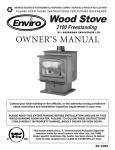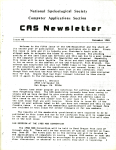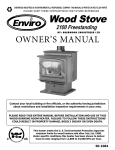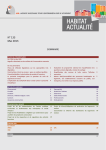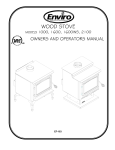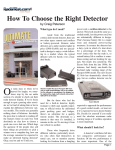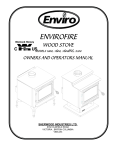Download june newsletter
Transcript
Page 5 VOLUME 4, ISSUE 2 By Raymond McQuillen If you are having difficulty paying your mortgage or know you will have difficulty in the near future, act now. Call 1-888-995-HOPE to connect with a HUD-approved housing counselor. Go to www.foreclosurehelpandhope.org for tips on what to do to prepare. Find a foreclosure counselor near you: NeighborWorks America developed a “find a foreclosure counselor” look up to help homeowners in danger of losing their homes locate a nonprofit, HUDapproved counseling agency for free, trusted help. Contact your mortgage company directly: hopenow.com, maintained by the HOPE Now Alliance, has a handy search tool to help you get in touch with your mortgage servicer. If your mortgage company is not in the database, you are advised to call 1-888-995-HOPE. Beware of Loan Modification Scams: Loan modification scams are a growing problem across the country. Homeowners facing foreclosure are losing their money – and their homes – to loan modification scams. Information is your best defense. If you see the signs of a scam and know the facts, you can protect yourself. Learn about your options under President Obama's Making Home Affordable Plan The Making Home Affordable website includes opportunities to modify or refinance your mortgage to make your monthly payments more affordable. It also includes the Home Affordable Foreclosure Alternatives Program for homeowners who are interested in a short sale or deed-in-lieu of foreclosure. Sharing Sharing among ancient people around the world when there was plenty, was a way of life. People that did not have what others needed would share the excess. Some things showed up by accident; such as a whale that has made a bad mistake by getting washed up on Orick beach, either dead or alive. The whale would be dispatched to the village immediately and all the surrounding villages would show up to receive parts of the carved whale. A story like this was told to me by my mother’s mother. She was from either Espau or Gold Bluff. Dried surfish or Kha’gess was very good to trade for acorns and mushrooms. Also stellar sea lions meat was shared, except for the man who held the Flipper Rites. The Flipper Rites are another story. Sincerely, Frank M. Lara YIHA NEWSLETTER The Great Debate By: Page 6 Yvonne Miller Yes, it’s that time again. My current gas grill is ready to be retired from service and so I am now in the market for a new one. As summer time creeps up on us, I am once again forced to consider one of the great debates of all time: should I buy a gas or charcoal barbecue? When it comes to gas or charcoal, hard-core grillers love to debate considerations such as cooking time, flavor, authenticity, and temperature control. But many barbecue infidels like myself tend to look at cost first. From a purely financial perspective, there is a significant short-term cost difference depending on whether you choose gas or charcoal barbecues. But frugal folks who are focusing on a barbecue with price as their key discriminator should consider not only the original purchase price of the grill, but also maintenance and operating costs as well. As you will see in the following analysis charcoal is the clear winner in the short run, but what about the long run? Purchase Price: Generally speaking, when it comes to startup costs, charcoal grills offer the lowest prices. The most basic charcoal grills can be had for as little as $25, however you can find high-end charcoal grills for as much as $2000. Gas and electric grills start around $125 for the low-end models. Like the charcoal models, gas grills can also be found for thousands of dollars. Fuel Costs: Folks who like to use the standard six-quart chimney starters instead of lighter fluid will spend between $4 and $5 per cookout when using high-quality briquettes. Here is a comparison between Kingsford charcoal briquettes and a barbecue brick; the briquettes averaged about $4 per hour of burn time while the bricks averaged $3.75 over the same period. Well, on average, you can get two hour-long cookouts per pound of propane. Therefore, a five pound tank will get you ten cookouts. I recently saw an advertisement for 20-pounds of propane at a cost of $28. Based upon that price, gas barbecues currently average about 70 cents per one-hour cookout. Maintenance Costs: The beauty of charcoal grills is that they generally require very little maintenance. Other than the grill grates that experts recommend should be replaced every one or two years, for lower end models there shouldn’t be any other maintenance costs. With gas grills, you not only have to refill the propane tank (assuming you do not have a direct connection to your home gas line), but you also have to maintain the gas connections and lines, the igniter, and grates. You also must be sure to keep the burners, igniter collector box, and drip tray clean. Oh yes, and you may need to replace the flavor briquettes if you choose to use them as well! For many folks, choosing a barbecue can involve many different considerations. When it comes to cost effectiveness, charcoal grills tend to offer lower up -front costs than gas or electric grills. However, for those who care, over the long run the initial savings of charcoal grills can be quickly eaten up by the corresponding fuel costs. Ultimately, however, neither charcoal nor gas grills can claim a complete cost advantage over its rival. In other words, the great debate continues. Page 7 VOLUME 4, ISSUE 2 By: Charity Hunter When it comes to lawn care, you could say there are the overachievers and the underachievers. The overachievers use just about every fertilizer they can, water their lawns religiously twice a day and mow and trim weekly to achieve a healthy, green lawn. The underachievers let nature take its course when it comes to watering and only mow their lawns when the grass reaches ankle height. While a healthy lawn is an important home maintenance measure, too much care could cause more harm than good and too little could bring costly problems down the road. Luckily, there is a happy medium between the two, one that could keep your lawn healthy without depleting your household budget. While grass pretty much grows maintenance-free, it still needs certain nutrients to prevent it from becoming susceptible to disease and insects. Plus, a healthy lawn brings some cost-saving benefits. It cools the house in warm weather months and increases the value of your home. Here are some low maintenance tips to a healthy lawn: WATERING: Despite common beliefs, you don't have to water your lawn every day. In fact, you should try to avoid daily watering because it will cause shallow root growth and make your lawn more susceptible to drought conditions. During the growing season, your lawn needs at least one inch of water every three days. During hotter weather, more frequent watering may be necessary. Signs of a thirsty lawn are curling or bluish-green grass blades. Another good test is to walk across your lawn. If you see your footprints when you look back, your lawn needs water. If time is of the essence, use sprinklers instead of gardening hose to water. The best time for lawn watering is early in the morning because grass left wet overnight increases the risk of disease and fungus MOWING: It's important to mow your lawn regularly, preferably during early evening hours. Lawn and garden experts recommend cutting off only one-third of the grass blade growth at a time. If you cut too much of the grass blade, you might develop yellow patches throughout your lawn. As a way to save on fertilizing and to promote recycling, leave the clippings on the lawn. Grass clippings decompose in about 7 days and give your lawn 25 percent of its fertilizer needs. Also not only is it good to have a well-kept lawn but that it is a requirement for our Low Rental Tenants and Mutual Help Tenants to maintain their own lawn. You can find this rule located in our Rental and Mutual Help Tenant Rules & Regulations under section 6) tenants agree to keep their units clean and not littered, deface or damage any part of the unit or grounds. Or on page four of the Occupancy Policy under grounds: Be in neat, orderly fashion, free of debris. Public Notice: Statement of Activities: The YIHA is making application to the USDA Rural Housing Services for $50,000 in funds under section 533 Housing Preservation Grants (HPG) program. HPG grant funds will be leveraged with NAHASDA grant funds to provide additional assistance to low and very-low income households. The public review dates: June 1, 2012 to June 24th, 2012. Closing Comment date: 6/24/12. PRSRT STD U.S. POSTAGE PAID PERMIT NO. 17 KLAMATH, CA. 95548 15540 US HWY 101 N KLAMATH, CA. 95548 Outside a pharmacy in a busy street, a poor man was holding onto a bus stop pole for dear life. He was not breathing, not moving, and not twitching a muscle. He was just standing there, frozen. The pharmacist assistant, seeing this strange sight in front of his shop, goes up to the pharmacist and asks, "What's the matter with that guy? Wasn't he in here earlier?" The pharmacist replies, "Yes he was. He had the most terrible cough and none of my prescriptions seemed to help." The assistant looks back at the man outside and says, "He seems to be fine now." The pharmacist replies, "Sure, he does. I gave him a box of the strongest laxatives on the market. Now he won't dare cough!" Fredrick Scott, Robert Grubbs, Vincent Weldon, Clyde Dickey, Charlotte Baker, Betty Weldon, Lawrence Myers, Nancy McCovey, Lena-Belle Gensaw, Talia Brown, Julianna Stanshaw, Maryce McCovey, Jazzmyn Bonato, Rylee Ray, Michael Obie, Jessica Clayburn, Lena Trimble, Trayce Crutchfield, Lisa McConnell, Rosa Galyean, Rachel Rakestraw, Samantha Myers, Brenden Crutchfield & Luana Johnson, John Safford, Raymond McQuillen, & Joe Brien Newsletter Newsletter— —June 2012 Board of Commissioners Betty Brown-Orick Donald Natt-North Elise Williams-Requa Kerri Malloy-South Glen Roberts-East EW Pearson-Weitchpec Bertha Peters-Pecwan Maintenance Page 2 Announcements Page 3 Cooks Corner Page 4 Kohte’li Foundation Page 5 Fiscal Page 6 Program Operations Page 7 To contribute to July’s newsletter, please submit articles by June 20th. By: Joe Brien With spring in the air and weekend projects on your mind, I wanted to give you some ideas as to prevent simple weekend projects into long drawn out expensive projects. Preventive maintenance can make that difference. Below are samples of things that should be done to prevent costly repairs. MONTHLY • Fire Extinguisher: Check that it's fully charged; recharge or replace if needed.• Sink/Tub Stoppers and Drain Holes: Clean out debris.• Garbage Disposal: Flush with hot water and baking soda.• Water Softener: Check water softener salt drum and replenish salt if necessary.• Forced-Air Heating System: Change filters once a month if user's manual recommends fiberglass filters. EVERY 2 MONTHS • Wall Furnace: Clean grills.• Range Hood: Clean grease filter. EVERY 3 MONTHS • Faucet: Clean aerator.• Tub Drain Assembly: Clean out debris; inspect rubber seal and replace if needed.• Floor and Outdoor Drain Grates: Clean out debris. EVERY 6 MONTHS • Smoke Detector: Test batteries and replace if needed.• Toilet: Check for leaks and water run-on.• Interior Caulking: Inspect caulking around tubs, showers, and sinks; replace any if it is deteriorating.• Forced-Air Heating System: Change semi-annually if user's manual recommends high efficiency pleated or HEPA-style filters.• Garbage Disposal: Tighten drain connections and fasteners.• Clothes Washer: Clean water inlet filters; check hoses and replace them if they are leaking.• Clothes Dryer: Vacuum lint from ducts and surrounding areas.• Wiring: Check for frayed cords and wires; repair or replace them as needed.• Range Hood: Wash fan blades and housing. EVERY SPRING • Roof: Inspect roof surface, flashing, eaves, and soffits; repair if needed.• Gutters and Downspouts: Clean them out or install no-clean version. Inspect and repair weak areas; check for proper drainage and make repairs if needed.• Siding: Inspect and clean siding and repair if needed.• Exterior Caulking: Inspect caulking and replace any that is deteriorating.• Windowsills, Doorsills, and Thresholds: Fill cracks, caulk edges, repaint; replace if needed. (Continued on Page 2) YIHA NEWSLETTE R Page 2 (Development by Joe Brien, Continued from Front Page) • Window and Door Screens: Clean screening and repair or replace if needed; tighten or repair any loose or damaged frames and repaint if needed; replace broken, worn, or missing hardware; tighten and lubricate door hinges and closers.• Roof: Inspect roof surface, flashing, eaves, and soffits; repair if needed.• Gutters and Downspouts: Clean out. Inspect and repair weak points; check for proper slope.• Chimney or Stovepipe: Clean flue (more frequently if needed); repair any cracks in flue or any loose or crumbling mortar.• Siding: Inspect and clean siding and repair if needed.• Exterior Caulking: Inspect caulking and replace any that is deteriorating.• Storm Windows and Doors: Replace any cracked or broken glass; tighten or repair any loose or damaged frames and repaint if needed. Replace damaged hardware; tighten and lubricate door hinges and closers. • Window and Door Weather Stripping: Inspect and repair or replace if it is deteriorating or if it does not seal. • Thermostat: Clean heat sensor, contact points, and contacts; check accuracy and replace thermostat if it is not functioning properly.• Outdoor Faucets: If you live in an area with freezing winters, shut off valves to outdoor faucets. Open spigots and drain, store hoses. ANNUALLY • Septic Tank: Have a professional check the tank (watch for backup throughout the year). In many areas, it is recommended that the tank be pumped every year.• Main Cleanout Drain: Have a "rooter" professional clean out the main line, particularly if there are mature trees in your yard whose roots could have cracked the pipe in their search for moisture.• Water Heater: Drain water until it is clear of sediment; test temperature pressure relief valve; clean burner and ports (gas heater).• HVAC System: Have a professional tune up your heat/air conditioning system. Pest Prevention by Scott Huffman Spring and summer is the time to have friends and family over for BBQ and to hang out. But there are some guests you don’t want hanging out at your next BBQ—Ants. Ants are common pests, but they are easily controlled if you follow a few simple steps. · · · · You can use your vacuum to quickly get rid of the invaders already in your house. Vacuum them up, along with some cornstarch, so that they suffocate in the vacuum. If they’re nesting in a potted plant, take it outside and flood it several times. If they’re in the garbage can, empty it outside and wash it down with a citrus-based cleaner or a weak bleach solution (one part bleach to ten parts soapy water). Create a "moat" for pet food by placing the food bowl in a somewhat larger shallow tray or pie pan filled with water. Or feed your pet only what it will eat immediately, and then wash the bowl. Put kitchen scraps into a tightly-sealed plastic container. Throw non-recyclable food containers (plastic ice cream cartons, meat wrapping paper, etc.) in an outside trash can. Wash glass, tin, and aluminum food containers thoroughly before tossing them into an indoor recycling bin Put the most ant-attractive food items (honey, sugar, sweet liqueurs, cough syrup, etc.) into the fridge or into jars with rubber gaskets and lids that close with a metal clamp. Unless the lid of a screw-top jar has a rubber seal, ants can follow the threads right into the jar – although a couple of layers of waxed paper (not plastic wrap) between the jar and the lid often work pretty well as a barrier, once the lid is screwed down tightly. Transfer other foods, such as cookies in open boxes, to containers with tight-fitting lids; put butter in the fridge. NOTE: paper and cardboard boxes are not ant-proof. Page 3 VOLUME 4, ISSUE 2 Attention Students!!! To qualify for Student Rental Assistance, the student must submit a complete and signed application and provide the documentation needed for that program. Assistance will start when the application is completed, not the time the application was turned in. If you have any questions on what our Student Rental Assistance Program is or how to apply for it please call the office. MISSOULA CHILDREN’S THEATRE What do you do when your town is overrun by rats? You call THE PIED PIPER! ATTENTION student, Parents, and Guardians: The kids had so much fun last year that the MISSOULA Children’s Theatre is back! The Group workshop for the Missoula Children’s Theatre Production of “The Pied Piper” will begin on Monday July 9th through Friday the 13th from 10AM to 3pm and the official performance will be on Saturday July 14th. There are 60 roles for kids entering 1st-12th grade! No advance preparation is necessary all the Children need to do is have a great time and bring a smile! If your child is interested in participating in this motivated social event please come!! For more information call Charity Hunter, Program Specialist at 707-482-1506. YIHA NEWSLETTE R Page 4 Chicken and Broccoli Alfredo Ingredients: ½ of a 1 pound package fettuccine 1 cup fresh or frozen broccoli flowerets 2 Tablespoons butter 1 lb. skinless, boneless chicken breast, cut into 1 ½inch pieces 1 can (10 ¾ ounces) condensed cream of mushroom soup ½ cup milk ½ cup grated Parmesan cheese ¼ teaspoon ground black pepper Directions: 1. Prepare the fettuccine according to the package directions in a 3-quart saucepan. Add the broccoli during the last 4 minutes of cooking. 2. Drain the linguine mixture well in a colander. 3. Heat the butter in a 10-inch skillet over medium-high heat. 4. Add the chicken and cook until it's well browned, stirring often. 5. Stir the soup, milk, cheese, black pepper and linguine mixture in the skillet. 6. Cook until the mixture is hot and bubbling, stirring occasionally. Serve with additional Parmesan cheese. 7. Serve with warm buttered brown and serve dinner rolls. By: Charity Hunter By: Charity Hunter As part of our Breathe Easy Solutions, the California Alternate Rates for Engergy (CARE) Program provides a monthly discount on energy bills for income-qualified households. Qualified households may receive an average annual discount of $600.00 Check the table below to see if you qualify: Number of Persons in Household Monthly* Annual * 1-2 $2,650 $31,800 3 $3,116 $37,400 4 $3,758 $45,100 5 $4,400 $52,800 6 $5,041 $60,500 For each additional person, add: $641 $7,700 *Before taxes on current income sources Valid until May 31, 2012 If you qualify, please visit www.pge.com/care or call 1-866-743-2273 for additional information. You may also be eligible for Energy Savings Assistance Program which provides income qualified renters and homeowners with easy, free solution to help manage your energy use and save money on their monthly energy bills.









